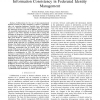Free Online Productivity Tools
i2Speak
i2Symbol
i2OCR
iTex2Img
iWeb2Print
iWeb2Shot
i2Type
iPdf2Split
iPdf2Merge
i2Bopomofo
i2Arabic
i2Style
i2Image
i2PDF
iLatex2Rtf
Sci2ools
138
click to vote
IEEEARES
2010
IEEE
2010
IEEE
FedWare: Middleware Services to Cope with Information Consistency in Federated Identity Management
—Collaborations by the use of inter-organizational business processes can help companies to achieve a competitive edge over competing businesses. Typically, these collaborations require an efficient identity management (IdM) that ensures the authorized access to services in different security domains. The successful implementation of an IdM in distributed systems requires to cope with a diversity of systems and to manage the challenges of integration. While integration should not introduce an unnecessary degree of dependence and complexity, various IdM goals should be achieved by integration: in particular, collaboration-wide consistency of identity information. Due to its decentralized and modular design, a federated identity management (FIM) approach is a promising strategy in distributed systems. Our thesis is that the distributed character and heterogeneity of involved systems requires appropriate informationconsistency mechanisms that go beyond what is offered by current FIM pr...
Consistency Issue | Current Fim Protocols | Distributed Systems | IEEEARES 2010 | Security Privacy |
| Added | 17 May 2010 |
| Updated | 17 May 2010 |
| Type | Conference |
| Year | 2010 |
| Where | IEEEARES |
| Authors | Thorsten Höllrigl, Jochen Dinger, Hannes Hartenstein |
Comments (0)

